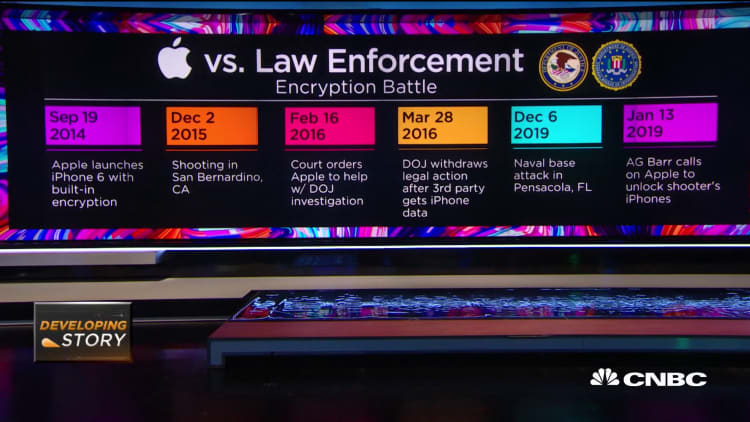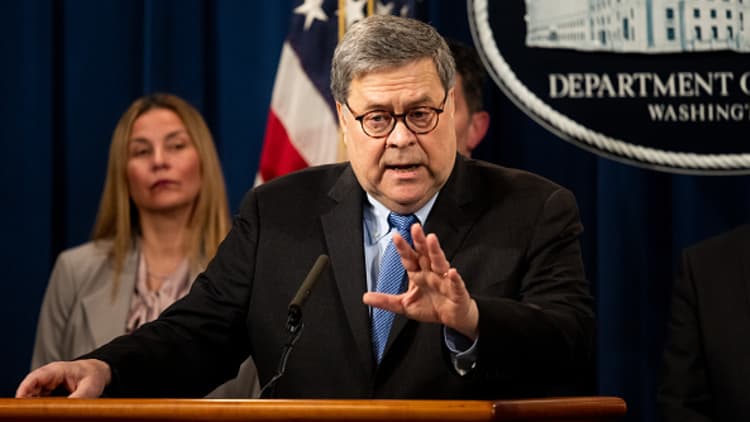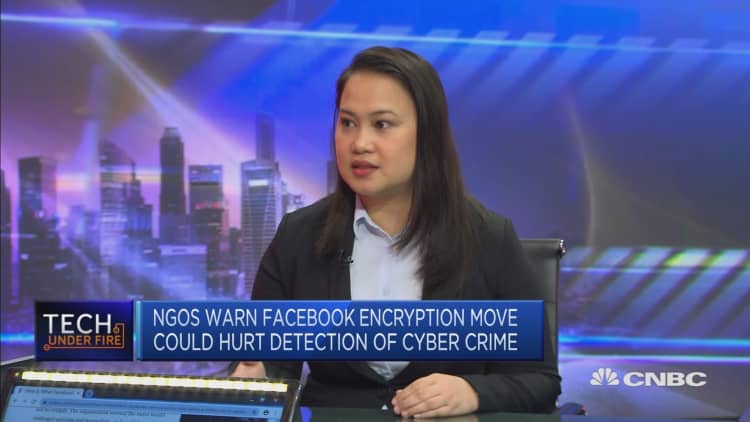
Apple disputed Attorney General William Barr's assessment that it has failed to provide law enforcement with "substantive assistance" in unlocking the password-protected iPhones used by the shooting suspect at a Navy base in Pensacola, Florida, last month, but still refused his main request to provide a backdoor.
"We reject the characterization that Apple has not provided substantive assistance in the Pensacola investigation. Our responses to their many requests since the attack have been timely, thorough and are ongoing," Apple said in a statement late Monday.
Apple said it "produced a wide variety of information associated with the investigation" after the FBI's initial request on Dec. 6. The company said it provided "gigabytes of information" including "iCloud backups, account information and transactional data for multiple accounts" in response to further requests that month.
Saudi Air Force 2nd Lt. Mohammed Saeed Alshamrani shot to death three Americans at Pensacola Naval Air Station on Dec. 6. The 21-year-old gunman was fatally shot by a deputy sheriff during the attack, which U.S. officials called an act of terrorism.
Apple continues to refuse Barr's request that it help find a way for law enforcement to access encrypted devices with a court order, like the one Apple resisted in 2016 in the case of a shooter's iPhone in San Bernardino, California. In that case, the point was dropped when the FBI was able to crack into the phone without Apple's help, but the incident raised questions about the balance between civil liberties and public safety that have yet to be settled.
"We have always maintained there is no such thing as a backdoor just for the good guys," Apple said in its latest statement. "Backdoors can also be exploited by those who threaten our national security and the data security of our customers. Today, law enforcement has access to more data than ever before in history, so Americans do not have to choose between weakening encryption and solving investigations. We feel strongly encryption is vital to protecting our country and our users' data."

Apple made a similar point at a congressional hearing in December as senators threatened regulation if tech companies could not figure out a way to work with law enforcement to legally access encrypted devices and messages. A Facebook representative also attended the hearing, defending the company's plans to make its entire private messaging system end-to-end encryption, which law enforcement fear will make it harder for them to track down instances of child exploitation, as they do now.
Apple said it has provided the FBI with technical assistance in the Pensacola case that has not required it to build a backdoor to its encryption. Apple said it was only recently notified by the FBI about a second iPhone in the investigation that law enforcement needed help to access. After receiving a subpoena "for information related to the second iPhone," on Jan. 8, Apple said it responded "within hours."
Apple pledged to continue working with the FBI. But unless the company agrees to provide a way for law enforcement to access encrypted devices, it seems clear Barr won't be fully satisfied.
"This situation perfectly illustrates why it is critical that investigators be able to get access to digital evidence once they have obtained a court order based on probable cause," Barr said in the speech Monday about the Pensacola case. "We call on Apple and other technology companies to help us find a solution so that we can better protect the lives of Americans and prevent future attacks."
Read Apple's full response below:
We were devastated to learn of the tragic terrorist attack on members of the US armed services at the Naval Air Station in Pensacola, Florida on December 6th.We have the greatest respect for law enforcement and routinely work with police across the country on their investigations. When law enforcement requests our assistance, our teams work around the clock to provide them with the information we have.
We reject the characterization that Apple has not provided substantive assistance in the Pensacola investigation. Our responses to their many requests since the attack have been timely, thorough and are ongoing.
Within hours of the FBIs first request on December 6th, we produced a wide variety of information associated with the investigation. From December 7th through the 14th, we received six additional legal requests and in response provided information including iCloud backups, account information and transactional data for multiple accounts.
We responded to each request promptly, often within hours, sharing information with FBI offices in Jacksonville, Pensacola and New York. The queries resulted in many gigabytes of information that we turned over to investigators. In every instance, we responded with all of the information that we had.
The FBI only notified us on January 6th that they needed additional assistance a month after the attack occurred. Only then did we learn about the existence of a second iPhone associated with the investigation and the FBI's inability to access either iPhone. It was not until January 8th that we received a subpoena for information related to the second iPhone,which we responded to within hours.Early outreach is critical to accessing information and finding additional options.
We are continuing to work with the FBI, and our engineering teams recently had a call to provide additional technical assistance. Apple has great respect for the Bureaus work, and we will work tirelessly to help them investigate this tragic attack on our nation.
We have always maintained there is no such thing as a backdoor just for the good guys. Backdoors can also be exploited by those who threaten our national security and the data security of our customers. Today, law enforcement has access to more data than ever before in history, so Americans do not have to choose between weakening encryption and solving investigations.We feel strongly encryption is vital to protecting our country and our users' data.
WATCH: How encryption affects the detection of cyber sex crimes



